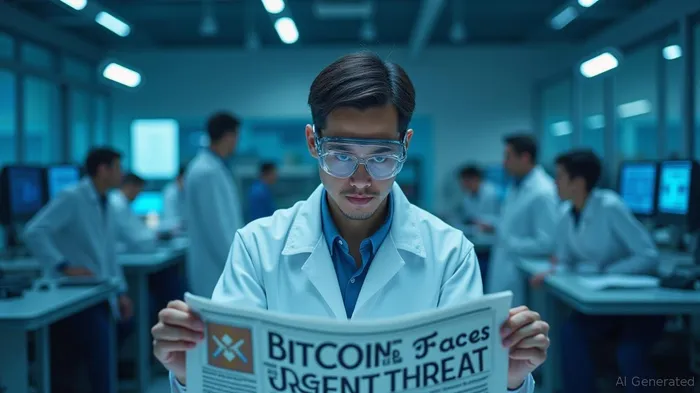Bitcoin Faces Urgent Threat From Quantum Computing Advances
Bitcoin, the world's first decentralized cryptocurrency, has been a revolutionary force in the financial landscape since its inception in 2008. Created by the pseudonymous Satoshi Nakamoto, Bitcoin was designed to offer a secure and decentralized monetary system, built on elliptic curve cryptography. This combination of mathematical rigor and decentralization has attracted both skeptics and major financial institutionsFISI--, such as BlackRockREM--, over the years.
However, the adventADN-- of quantum computingQUBT-- poses a significant threat to Bitcoin's security. Quantum computersQUBT--, which operate on principles vastly different from classical computers, have the potential to break the cryptographic algorithms that protect Bitcoin's private keys. This could render Bitcoin's security mechanisms obsolete, making it vulnerable to attacks.
Government agencies, such as the US National Institute of Standards and Technology and the National Security Agency, are already preparing for this transition, aiming to fully adopt quantum-secure standards by 2030. However, the Bitcoin community appears to be lagging behind, with theoretical solutions like BIP-360 (Pay-to-Quantum-Resistant-Hash) or commit-delay-reveal schemes being proposed but not yet implemented.
The urgency of the situation was highlighted by the development of Microsoft's Majorana chip, which accelerated the timeline for creating a useful quantum supercomputer from decades to years. This breakthrough paves the way for scalable and stable quantum systems, which could potentially break Bitcoin's cryptography within five years or less.
The rise of quantum computing is not just about speed; it's about a fundamentally different way of processing information. Quantum computers run calculations in parallel, making them lethal to classical cryptography like the ECDSA algorithm that protects Bitcoin's private keys. This poses a significant risk to Bitcoin holders, as a breach could result in the loss of funds and undermine the trust in the system.
The concept of "Q-Day," the day when quantum computers are ready to break traditional cryptography, is a looming threat. On this day, Bitcoin transactions validated and secured today or even a decade ago could still be vulnerable. Bad actors are already collecting encrypted data in preparation for Q-Day, a strategy known as "harvest now, decrypt later." This underscores the need for Bitcoin to be ready for the onslaught of quantum computing.
Upgrading Bitcoin to post-quantum cryptography would require a hard fork, a significant and controversial step in the crypto community. This could potentially break the user experience, fragment liquidity, risk splitting the network, and alienate diehard supporters. However, there are alternatives, such as hybrid solutions that focus on securing transactions without touching the base layer, layered security models, and quantum-secure key management.
The Bitcoin community must act swiftly to prepare for a post-quantum future. Decisions must be made, and solutions must be chosen to ensure Bitcoin's survival. The community must evolve the system that Satoshi Nakamoto created, rather than waiting until it's too late. The most significant risk to Bitcoin is not quantum computing itself, but complacency.

Quickly understand the history and background of various well-known coins
Latest Articles
Stay ahead of the market.
Get curated U.S. market news, insights and key dates delivered to your inbox.

Comments
No comments yet